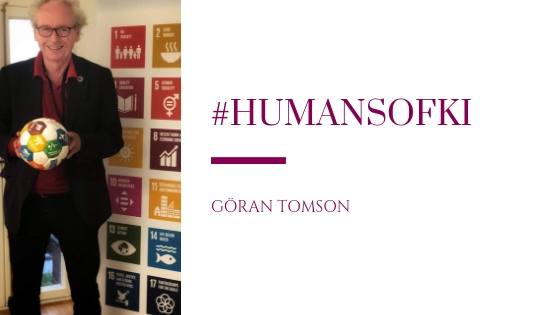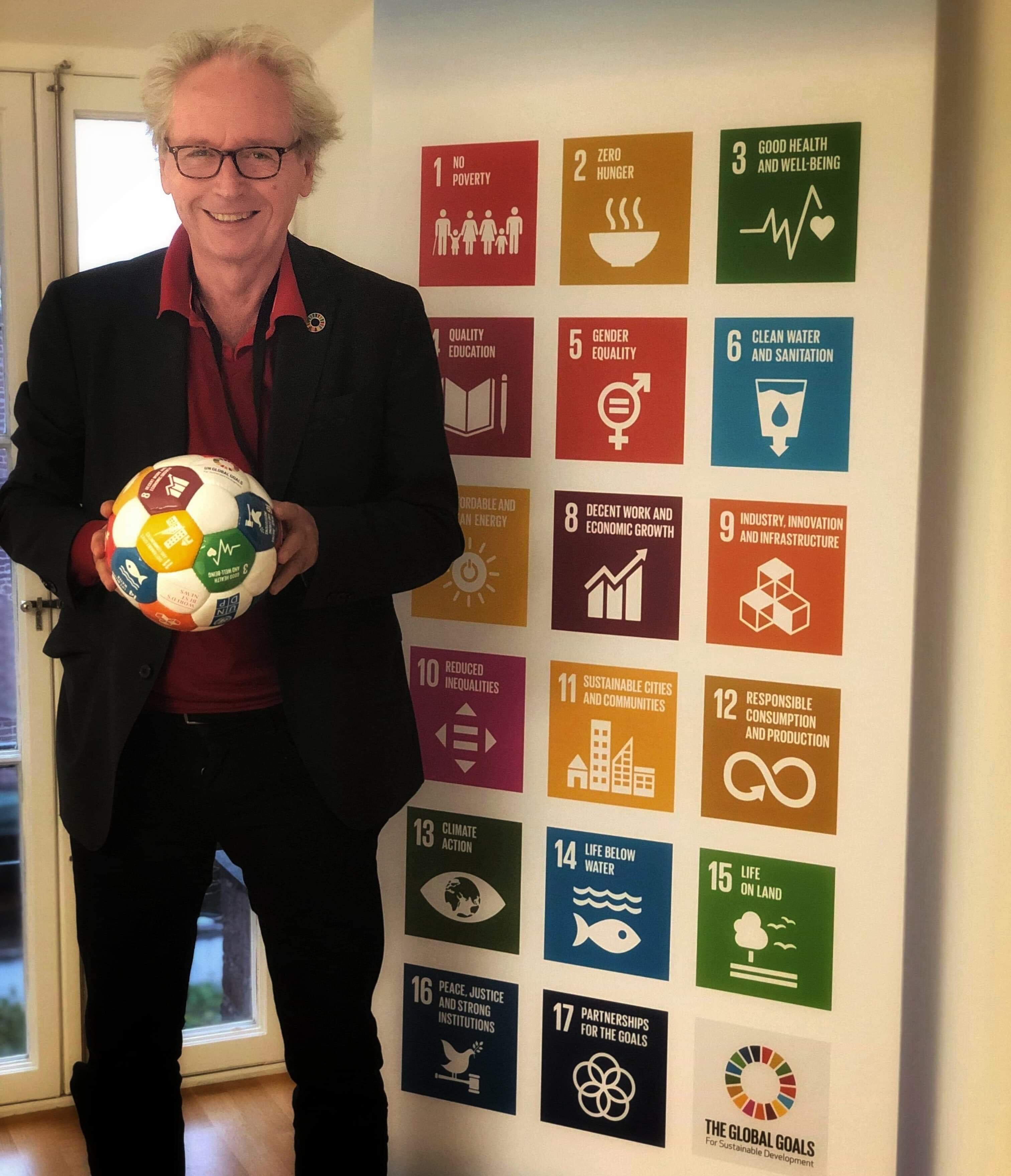
Göran Tomson, Senior Professor – #HumansOfKI
When I walked into the Royal Swedish Academy of Sciences on a cold Tuesday morning to meet Senior Professor of International Health Systems Research, Göran Tomson, I could not even image how inspiring and fascinating our talk will be. Read the recent #humansofKI interview to learn more about the universal health coverage, glocal approach in healthcare, and sustainable development, and how one person can be an agent of change for all those things.
Could you please tell us your position at KI and what you do here?
I am a Senior Professor of International Health Systems’ Research at Karolinska Institutet. I belong to the largest group at the Department of Public Health Sciences, the Health System and Policy research group. I also teach master and PhD courses. I am recently appointed Counselor at the President’s office in relation to the 2030 Agenda for Sustainable Development. I try to understand how Karolinska Institutet is working with agenda 2030 and the sustainable development goals because we need to work more for the future.
Can you tell us a little bit more about this agenda?
Karolinska Institutet is developing KI Strategy 2030 which is still under development and will be aligned with the UN 2030 Agenda.

Göran next to the UN 2030 Agenda
Your journey at KI started at the 70s with obtaining the medical degree. Why did you choose KI?
I chose KI because it was the most prestigious medical university, and it was convenient as well. I was born and raised here, in Stockholm. The most beautiful city you can imagine. Summer time, of course, not winter time.
What do you find to be the most rewarding about teaching at Karolinska Institutet?
It is fantastic to meet young people. One of the real assets of being an academician is meeting young, challenging, energetic, demanding people who want to make a difference. I believe in three levels of teaching. You have the informative learning which is collecting a lot of information to become an expert on a topic. Then you need to add values to become a professional, which is a formative dimension. And finally, when you add leadership attributes, you engage in the transformative learning. When you reach all three levels, you create agents of change. This is something I am trying to do. I’ve had many PhD students, almost 40. I am extremely grateful, and I feel privileged to see that many of them are full professors or directors in different parts of the world. It is very exciting.
What is the main focus of your research?
My research is very much focused on one of the targets of the Agenda 2030, Sustainable Development Goal (SDG) 3 [Ensure healthy lives and promote wellbeing for all at all ages], the universal health coverage. I am trying to facilitate the knowledge base whereby which decision-makers, planners and practitioners could deliver care to those most in need and reverse the inverse care law. The inverse care law states that those most in need gets least care of the lowest quality. In my research group, we have done a lot trying to ensure that children and mothers, the most vulnerable part of the population, get the care that they need.
I have been fortunate to have a very good mentor, Göran Sterky, who let me do things that were not so common. So I have been a builder which includes the coordination of the work that led to the Alliance for Health Policy and Systems Research, WHO. It works with things that are now a little bit similar with some of the SDGs including SDG 3, SDG 16 [Promote peaceful and inclusive societies for sustainable development, provide access to justice for all and build effective, accountable and inclusive institutions at all levels], as well as SDG 17 [Strengthen the means of implementation and revitalize the global partnership for sustainable development]. And then I was asked about 15 years ago by the leading person understanding the threat of antibiotic resistance Otto Cars and the Dag Hammarskjöld Foundation to help him establish the international network in order to contain antibiotic resistance, ReAct.
Your research focuses on universal health coverage with access to good quality of care and has been conducted both nationally and internationally. Can you give examples of some of the projects at Karolinska Institutet that you participate in?
One is called IMPACT. It is a one health project meaning that it includes human sector, animal sector and the environment. It is a collaboration between China and Sweden and is funded by the Swedish Research Council and the Chinese Research Council. It looks at how the use of antibiotic and the knowledge and attitudes towards antibiotics among the population and providers impacts the emergence and dissemination of antibiotic resistance in one of the largest provinces in China, Shandong. It also studies genetic aspects of antibiotic resistance, so it is a study from the cell to the society. It is a very interesting and unique project that is now at its last phase.
Another project is the SMART2D project. There is now an epidemic of diabetes type II in the world, and it is a very big threat to health especially in low and middle-income countries. SMART2D studies effects on DM type II treatment of strategic collaboration between actors in communities and primary healthcare compared to conventional primary healthcare. This study in conducted in one low-, one middle, and one high-income county: Uganda, South Africa and Sweden. It is funded by the European Union. We are looking to strengthen that collaboration compared to traditional care of type II diabetes. The challenges are global.
You have recently co-founded the Swedish Institute for Global Health Transformation, SIGHT. What are the objectives of SIGHT?
One of the objectives is to strengthen the Swedish resource base in global health for global health. Our second goal is to provide a network-platform for interdisciplinary global health research and education. Not only research, but also education, because if we are to meet SDGs, we have to work interdisciplinarily. The third objective is to facilitate knowledge translation between academia, policy makers and the public. The fourth objective is to ensure that health is taken into account in all SDGs and implementation of the 2030 Agenda. We see ourselves as a liaison: we need to ensure that different stakeholders like the civil society and government including different ministries not only the Ministry of Health and Social Affairs work with these authorities: Public Health agencies, the Swedish International Development Cooperation Agency, private sector, and, of course, the universities. One of the real strengths of SIGHT is that we work with all Swedish universities.
What the role of Karolinska Institutet in such network?
Karolinska institutet is the leading medical university in Sweden. It is also internationally very well renowned university. Global health at Karolinska Institutet is a high priority. In that sense, Karolinska Institutet is very important.
What do you think is the most challenging in achieving this interdisciplinary understanding globally?
That is a very difficult question. First, it is very difficult to talk about this globally because then it becomes too abstract. It is important to be as concrete as possible. That is why I believe in the glocal approach: both global and local. We have to make sure that the partnerships in SDG 17 include interdisciplinary collaboration locally. By locally I mean nationally at different levels, but also at different universities. The biggest challenge is to be open to others’ ideas. You have to have an understanding of other disciplinary perspectives. You need to trust each other. You need to be comfortable in your own zone with your own perspectives, and you need to take time that is essential to do the interdisciplinary work.
What is inspiration behind your work?
Partly it is my upbringing. I am from a family of civil servants and academicians. I think it is a combination of genetics and environment. It is also my mother who clarified how unfair it is with all these huge inequities around. As a pediatrician, understanding in a way which I never understood before, the social and commercial determinants of health served as an inspiration for my future research. And then, of course, inverse care law, those in need receive the least care of the lowest quality, is not fair. If you had had so many advantages like me, it feels very good to facilitate giving back. There is also an egotistical par. it is satisfaction because teaching is a rewarding experience and so is working in the world. My inspiration also comes from curiosity, and then you see results, amazing results. Ultimately, it is about people and the fantastic opportunity to work with people for people on a common goal.

0 comments